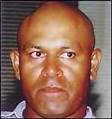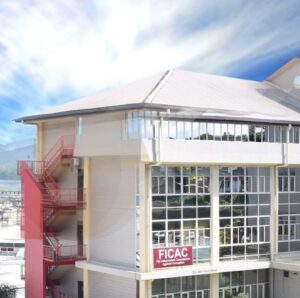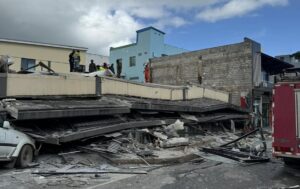“It is the sentence of this court that you be taken from this court to a prison and then to a place of execution where you will be hanged,” High Court Judge Michael Scott ruled on that dramatic day in February 2002.
Everyone gasped. 2000 coup leader George Speight had just been sentenced to death!
The penalty for Treason under the laws of that era. The last execution by hanging in Fiji was in 1964.
After Speight pleaded guilty to Treason, the most serious crime against the country, Justice Scott donned a black cap, historically and traditionally worn by Judges for very solemn occasions or when passing a death sentence, ruled accordingly, and uttered the fateful final definitive lines for those whose life would be no more.
“May God have mercy on your soul.”
I was on my way to the court house to hear the verdict but as I passed the Cottage, somebody invited me in for lunch and I got diverted. But journalists and those in attendance came spilling out with the dramatisation of what transpired in the courtroom.
“The colour drained from his face,” one told me.
“George wept. He was crying,” said another. His head was bowed, all that bravado gone.”
Speight’s supporters, who turned up in numbers during the trial were grim, declaring it a very sad day. Everyone looked around and listened in on conversations, trying to gauge the mood of the city, which was thick and heavy with tension. Security forces were on high alert.
Two years earlier we had seen how Speight and his supporters had turned a relatively peaceful morning in Suva into an afternoon of looting and destruction, that plunged Fiji into turmoil. A few hours after the death sentence was delivered, some of the tension was released when the President, the late Tui Vuda Ratu Josefa Iloilo commuted Speight’s death sentence to life imprisonment.
Most of the journalists of the era felt that justice had been done, even as Speight’s followers felt he was hard done by and betrayed. Speight claimed he had given up all his guns and was accorded immunity from prosecution when he signed the Muanikau Accord, but he was arrested at a checkpoint two weeks later, and the man who took government MP’s hostage was himself locked up and put on trial.
Speight’s legal team had announced that morning that Speight would plead guilty as a gesture to restore stability and start the process for reconciliation. Speight’s lawyer said he had instructed his supporters to be calm and peaceful.
But Justice Scott was unswayed and firm in his ruling, and many were in agreement.
“This should be a good lesson for everyone to follow the rule of law,” was the general sentiment.
Roll the dice, pay the price
The actions of George Speight and his men on 19 May 2000 had after all caused so much suffering and loss, put the country on the verge of civil war, saw beatings, violence and death, the closure of businesses, job losses and economic hardship, and ripped our already fragile race relations apart.
Large parts of the city of Suva that had been burnt to the ground had to be rebuilt, and the key tourism industry took a big hit and a long time to recover.
The feeling was that Speight had to pay and be made an example of. Despite all these, there was relief from all sides when Speight’s death sentence was commuted to life imprisonment by the Prerogative of Mercy Commission. Even the man who perhaps suffered the most from Speight’s coup, former Prime Minister Mahendra Chaudhry, who was held hostage and beaten in Parliament, allowed Labour ministers to vote freely when the bill to repeal capital punishment was brought to Parliament.
This week, the same Commission that recommended commuting his death sentence to life imprisonment, recommended his pardon and release from prison, after rejecting his petition for release several times over the last 22 years.
20 years ago, there was a sense among many that Speight would be pardoned and released after serving around 5-10 years, as alot of his supporters were in the SDL-CAMV government and were seen to be manuevering to get him out of Naboro with things such as the truth and national reconciliation process.
But all that was dashed when Bainimarama, the man who ordered George’s capture and arrest in Kalabu, and locked him away on Nukulau island to await trial, took over the country in a military coup in 2006. Bainimarama was adamant that Speight would not be let out.
How ironic then, and an example of the topsy-turvy nature of Fijian politics that while Speight has been deemed to have served his time and released, Bainimarama is in jail and serving time for perverting the course of justice.
It is also evidence of the long term and enduring negative effects of coups and the dangers of usurping democracy and the rule of law.
37 years after 1987, 24 years after 2000, and 18 years after 2006, we continue to be trapped in a vicious cycle that we are all still struggling to break away from.
And that is why, at this defining moment, our elected representatives and those in positions of leadership and influence must now move forward carefully and responsibly with their words and actions.
I’ve had several brief interactions and short conversations with George over the last 22 years, and word from those who spent more time with him inside is that by all accounts, Speight is a changed man. For the better.
But the fear and uncertainty his name brings to certain sections of the community lingers.
Ketan Lal was heavily criticised for his statement on Speight’s release reopening old wounds (although he neglected to also address the old wounds of 2006) but I feel it is important that all views are heard and respected so we can get to a place we can all move on from.
Because listening and acknowleding the views of those who sufferered or were traumatised by the events of 2000, and then the events of 2006, would hopefully bring some closure to what were dark chapters of our history.
And obviously, those who are not happy with Speight’s release will have to acknowledge and respect, hard as they may find it, why many are also celebrating his freedom from incarceration after 24 years.
This was perhaps best reflected by Mosese Bulitavu.
They disagree with each other, but if we can accept both Ketan and Bulitavu’s statements and forge a common way forward from there, we can be in a good place.
The release of Speight, and then possibly the pardon and release of Bainimarama could hopefully provide the catalyst of breaking out of the coup chapters, and this painfully frustrating cycle we continue to find ourselves in. To finally come full circle and then steer a new united forward looking path.
But who knows.
A few weeks back when discussing the proposed Truth and National Reconciliation Bill and process with some Editors and Ministers I asked if the people of Fiji were ready to handle the truth.
Some dark and ugly things happened in 2000 and 2006 that would indeed shock and open old wounds.
There are some things and details we could not report before that are yet to come out. What Fijians did to Fijians. Will it really help us move forward bringing that up again?
We have often tried to get Speight to reveal who else was behind the coup in 2000, and there were rumours of a tell-all book that could leave some people in power squirming. But in a written statement during his trial in 2002, Speight wrote that he would “not tell all, as it serves no purpose other than to cause further unrest and uncertainty.”
This is clearly an important moment and how leaders on both sides of the the political divide, as well as George Speight himself (who will clearly need the space and time to adjust) moves will decide how positive or negative the way forward will be.
The next few days, weeks and months is crucial and we must search for the best that is within us.
Photo: PINA









